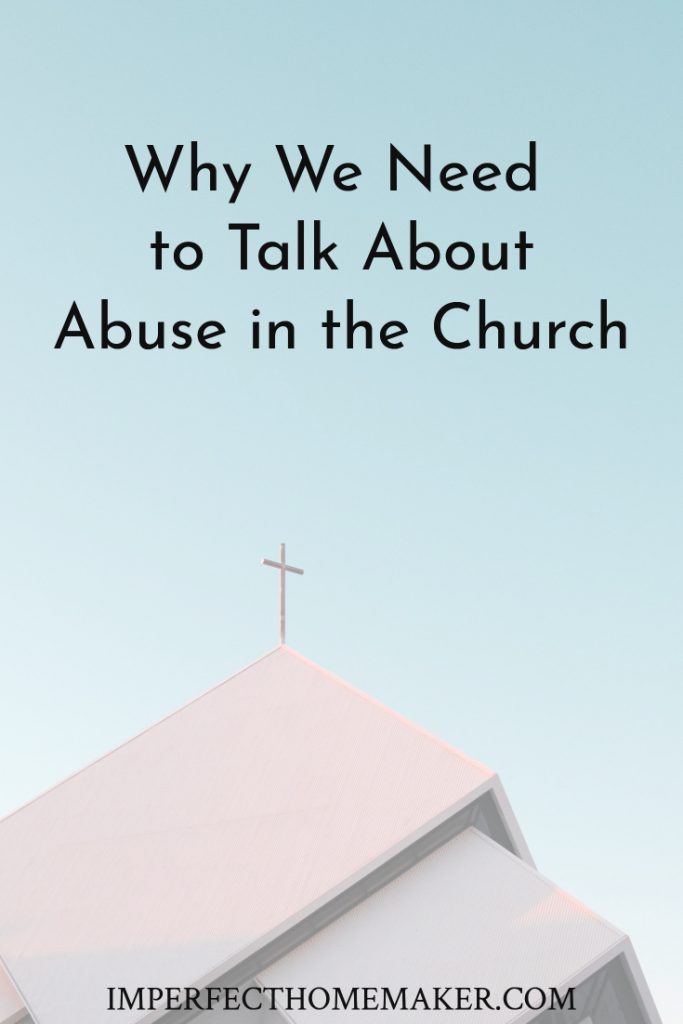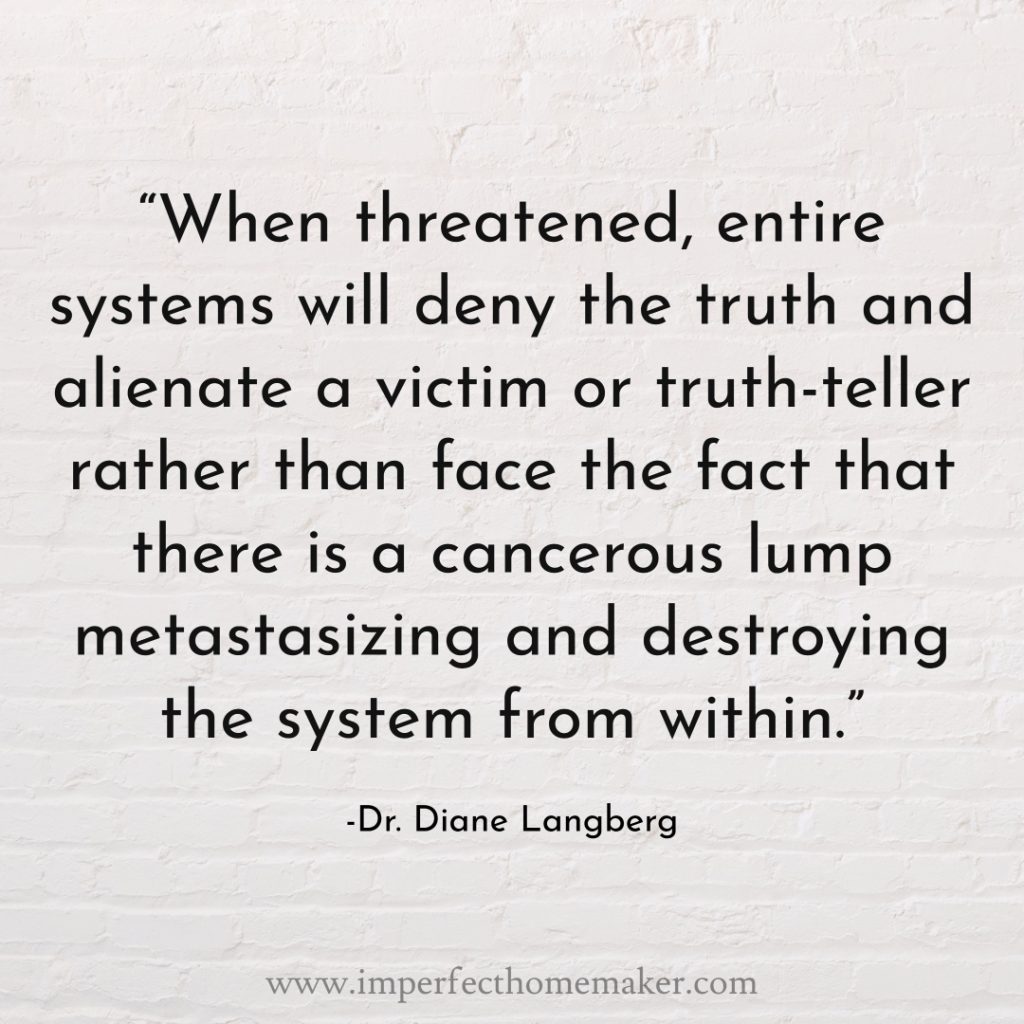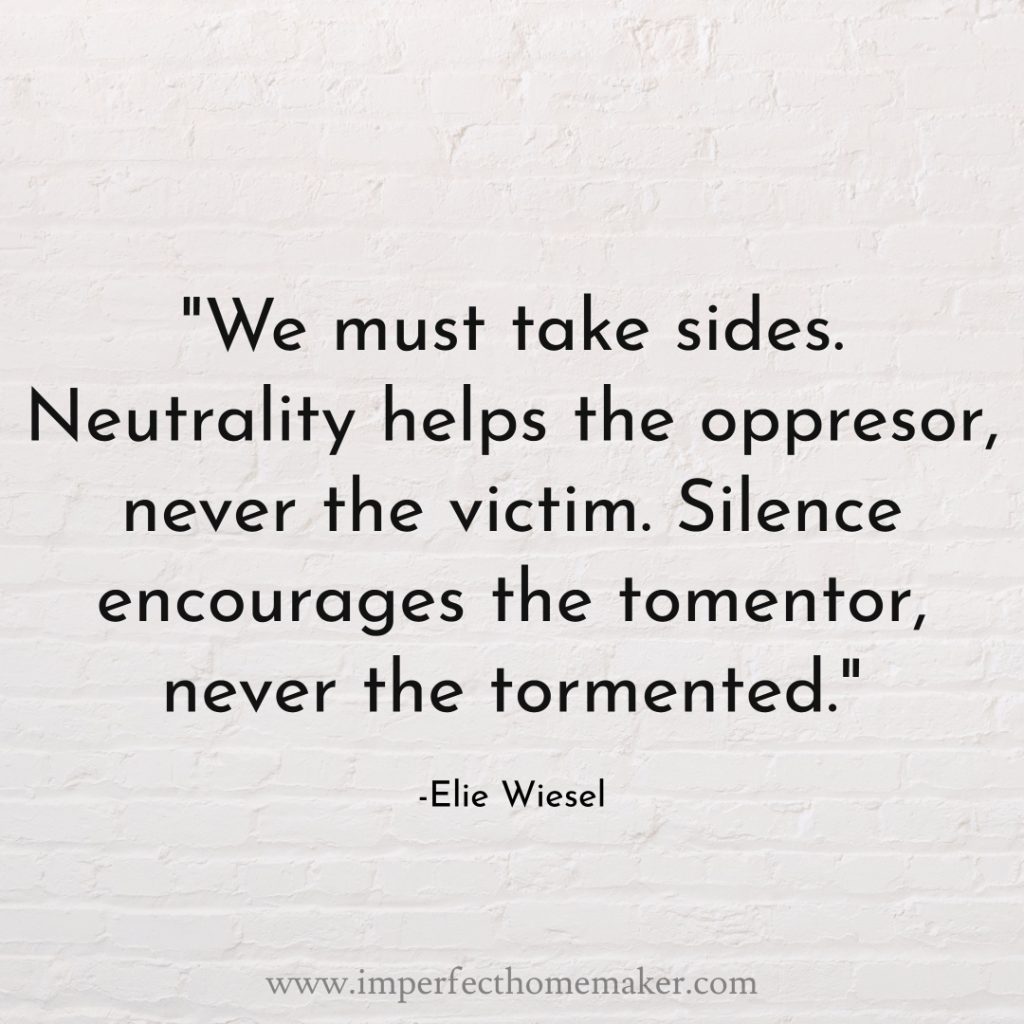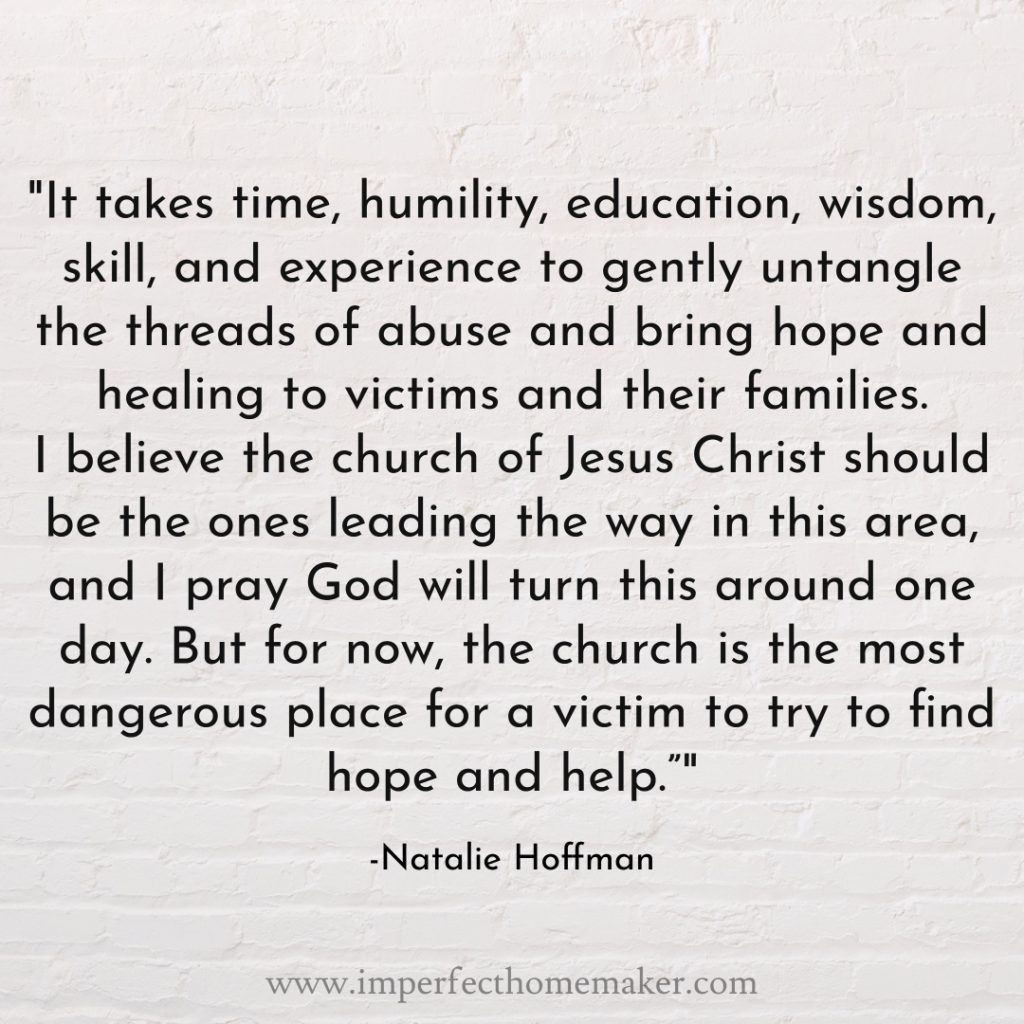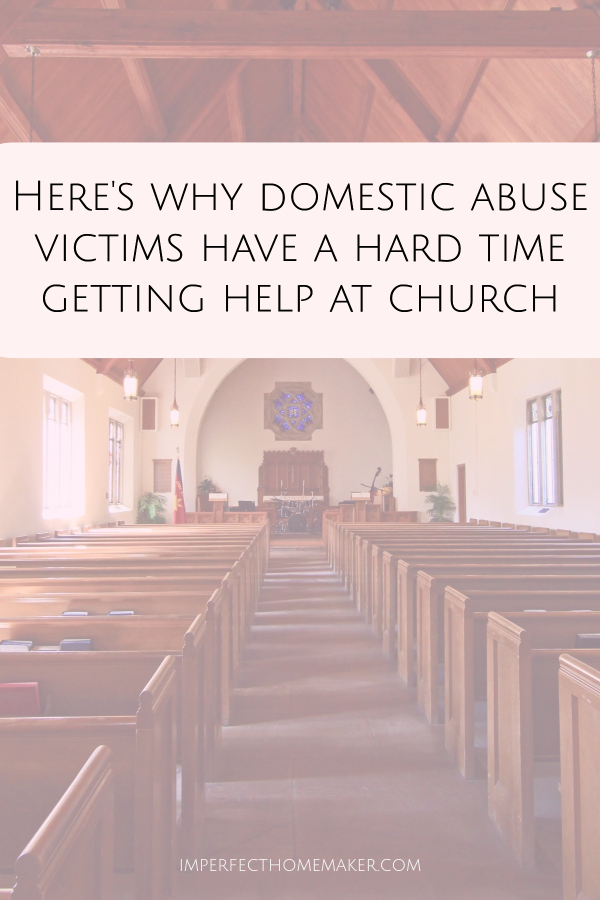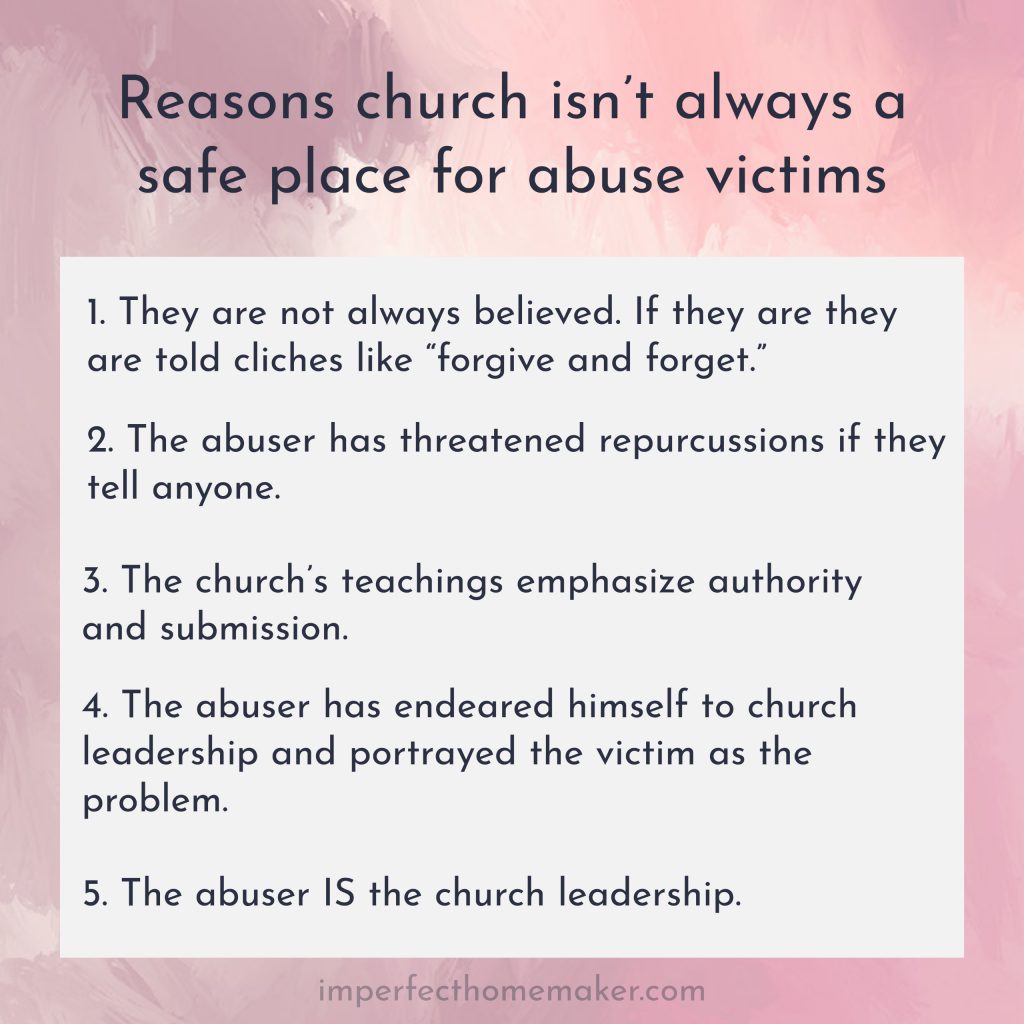Domestic Violence Prevalence in the Church: Facts Every Christian Should Know
Imagine a woman who deeply loves Jesus and desires more than anything to be a godly wife. Her husband makes a grand appearance of being a godly man; however, behind closed doors he is domineering and does not display the loving attributes of patience, kindness, etc. He demands her to serve him yet never serves in return. He punishes any failure of his wife to bow to his whims by calling her nasty names, giving her the silent treatment, yelling, spitting, throwing things, or in some other way throwing a grown-up tantrum.
When this woman seeks help from her church she is given simplistic advice to just try not to provoke him, to be submissive in spite of his selfishness, and to pray more for him. These instructions fail to understand the gravity of what she is experiencing and are deeply harmful to her.
Perhaps this scenario may sound like a one-off unfortunate experience; however, this post illustrates just how often this type of advice is dispensed to women who are suffering behind closed doors.
Domestic violence prevalence in the church is far more extensive than many people realize, yet it is an overlooked subject that demands more of our understanding and attention if the body of Christ is to be a source of hope and comfort to those who are being oppressed.
Defining Domestic Violence
Domestic violence is a pattern of coercive control that one spouse experts over another. The abusive individual uses a variety of tactics to maintain their control over their other, including:
- Physical Abuse: Any form of physical harm inflicted on a partner, such as hitting, slapping, or choking.
- Emotional Abuse: Manipulative behaviors designed to control, belittle, or demean a partner, such as constant criticism, threats, or intimidation.
- Psychological Abuse: Tactics that undermine a partner’s sense of self and mental well-being, including gaslighting, coercion, and isolation.
- Sexual Abuse: Any non-consensual sexual activity or coercion, including marital rape and forced sexual acts.
- Financial Abuse: Controlling or restricting access to financial resources, preventing a partner from earning or managing money.
- Spiritual Abuse: Using religious beliefs or practices to manipulate, control, or demean the other, often undermining their faith and autonomy for personal gain or dominance.
It is imperative to understand domestic violence as a pattern of control, which uses these various tactics (source: U.S. Dept. of Justice). Many people mistakenly assume that domestic violence is about a spouse with uncontrolled anger who perpetrates physical violence toward their partner. Although anger and physical violence may be part of the picture; domestic violence can occur without any hitting ever taking place. Wherever power and control are being exerted, by whatever means the abuser finds effective, there is domestic violence occuring. I personally prefer to use the term domestic abuse, or even better, coercive control.
Domestic Violence Prevalence in the Church
Statistics
Domestic abuse is not confined to any particular demographic or faith group. Statistics reveal that domestic violence prevalence in the church occurs at roughly the same rates as outside the church. For example:
- A survey conducted by Called to Peace Ministries found that 85% of the Christian women who had experienced abuse were married to men who claimed to be Christians. 30% of those men served in a ministry (source).
- A telephone survey of Christian women from a spectrum of liberal to conservative denominations revealed that up to 50% of Christian women have experienced intimate partner violence (source.)
- The Institute for Family Studies found that the rates of domestic violence across the globe are relatively similar regardless of the couple's religious affiliation (source).
- The personal experience of advocates within Christian communities reveals that domestic violence prevalence in the church is an epidemic.
Misconceptions about Domestic Violence in the Church
In spite of the troubling rate of domestic violence prevalence in the church, misconceptions about abuse prevent victims from receiving the hope and help they so desperately need.
Misconception 1: “Domestic violence only happens in non-Christian families.”
As demonstrated above, this belief is simply a myth. The first step toward being equipped to offer compassionate care to victims is believing that domestic violence occurs not just in the church, but that it occurs in your church.
Misconception 2: “If there were abuse occurring in my church I would know it.”
Abusers, especially those who call themselves Christians, are adept at living a lie. In public they appear devout and committed to their faith and only engage in abusive behaviors privately.
Misconception 3: “If someone in my church is suffering abuse, I am sure the church leaders would address it.”
Although I certainly hope your church leaders have a heart of compassion toward those who are suffering, the church often does more harm than good in such a situation when there is a lack of education about the dynamics of abuse.
One common mistake when church leaders attempt to address abuse within a marriage is to recommend marriage counseling, hoping that the couple will be able to resolve their marriage issues.
The problem with this approach is that abuse is not a marriage problem. It is one person powering over the other. A victim will be pressured to take responsibility for her part in the breakdown of the marriage, and the goal of counseling will be to repair the relationship. However, what an abuse victim needs is not an intact relationship; what she actually needs is safety from the abuser.
Another common mistake when church leaders attempt to address abuse is misusing common theological concepts having to do with repentance and forgiveness. They believe that when the abuser says “I'm sorry; I won't do it again,” that it's then incumbent on the victim to say, “I forgive you; let's pretend it never happened.” However, without demonstrating changed behavior over time, words of repentance are exactly that – words. The victim is not automatically safe to resume relationship just because the abuser said some nice words. To pressure her to do so places her in potential danger, but if she refuses to resume the relationship, she faces the spiritual guilt that has been placed upon her.
For many more examples of the devastation that can result from misunderstandings of theological concepts, read this post.
How Churches Can Address Domestic Violence in their Midst
There are many ways the church can be a safe and supportive place for those who are experiencing the oppression of domestic violence.
Education
Much harm has been done to victims of abuse by people who are well-meaning, simply because a lack of education led to the inability to recognize and respond to abuse well. If the church is to be a safe place for the oppressed, it is crucial for church leaders and members to be educated about domestic violence.
Speak about abuse from the pulpit
Many victims within the church do not even recognize their own experience as abuse. Especially in environments where women are taught they are always to submit, that the husband is the head of the home, that they are never to speak badly about him and always assume the best, their abusers are able to use these concepts to maintain domination over them. The victim believes she is doing God's will by submitting to the domination and never questioning her husband's behaviors. Describing abusive control and naming it as such will help victims to understand that it is not okay for them to be treated that way. Silence, however, keeps the abuser comfortable and confident he will never be called out.
Support Systems
Access to professional counseling from someone who has proper training in domestic abuse issues will give victims the opportunity to decipher what is happening to them and to make wise decisions about how to move forward in a God-honoring yet safe way. What a balm to a weary soul if a church had someone on staff (again, an individual trained in domestic violence, not just someone trained to recite Bible verses about forgiveness) or could provide financial assistance for victims to receive such counseling.
Additional ways that a church can support victims are facilitating support groups, facilitating educational seminars on domestic violence, and providing financially for emergencies and ongoing needs a victim has.
Policy Implementation
Churches need to implement and enforce policies that protect victims and hold abusers accountable. These policies should include clear procedures for reporting abuse, providing support, and ensuring the safety of all individuals involved.
Final Thoughts
Scripture provides guidance on protecting the vulnerable. Proverbs 31:8-9, calls for speaking up for those who cannot speak for themselves, and Micah 6:8, emphasizes God's heart to do justice and love mercy. I believe that one aspect of that is for the church to care for those who have been oppressed by domestic violence.
Should We Talk Publicly About Abuse in the Church?
Since I have turned this platform further towards shining a light onto domestic abuse in the church, I want to address a concern that some of my readers may have.
This concern is regarding whether speaking about abuse in the church in an online format is appropriate as it may present a poor impression to unbelievers or turn them away from Jesus.
My response to that concern will be two-fold.
First, although I am sharing these things in an online context, my audience is Christians. I am writing to the members of the body of Christ, pleading with my brothers and sisters not to look away from the suffering of others.
Second, while my audience is Christians, I am aware that it’s possible that unbelievers could see what I’ve written. I will address that concern too.
So let’s get into it.
A PLEA TO THE BODY OF CHRIST
I must plead with my brothers and sisters publicly because what is taking place are offenses against the entire body. I have not been personally offended in such a way that I can go privately to a brother or sister for reconciliation. I am addressing over-arching issues that are occurring among the entire body of Christ.
These are the main issues about which I am speaking:
- Wolves among the sheep
- Hypocrites who call good evil
- Ignorance among the body of the evil among us, and of scriptural interpretations which allow it to flourish.
- Indifference to the suffering of other members of the body
Wolves among the sheep
The Bible contains warnings to believers that wolves will enter in and circulate among the flock (Matthew 7:15; Acts 20:28-30; Romans 16:17-20). These people come into the congregation for the singular purpose of fulfilling their own desires for power, fame, sex, or money. They are difficult to spot because they intentionally disguise themselves as sheep. Yet when they are spotted by discerning members of the body, or when people who have been injured by them scream out in pain, often the rest of the congregation doesn’t believe the one crying out, or they make excuses for the wolf to remain in their midst. “He looks just like a sheep to me. I don’t see why he can’t stay. Even if he hurt someone, he has apologized, and it is our responsibility to show him grace.”
It seems that many have forgotten that wolves are wolves! They are dangerous predators! Of course they look like sheep; that’s their point! They want you to let them roam freely! Don’t play into their hand.
Dr. Anna Salter interviewed pedophiles, rapists, and other sex offenders and recorded the thought processes of these types of people. One of the offenders who abused a child at church said that people did not believe the accusations and that many people stood in his defense when he was told on. He says he intentionally did good deeds like mowing the yards of handicapped people, being generous with money, and visiting the elderly to cover up the type of person he really was.
I consider people that go to church gullible because they have a trust that comes from being Christian.
He said that church people don't want to believe those types of things happen, and they especially don't want them to believe they happen in their congregation. “Because of that it was all the more easy to convince them with my good deeds.”
My friends, this is how a wolf operates. Whether someone is sexually abusing people in the church or whether they are abusing their families, they are presenting the “sheep” side of themselves in public while they are a wolf in private, devouring others for their own gain.
It is important to speak out publicly, not only to warn people of specific wolves within a specific congregation, but to sound a wake-up alarm to the body of Christ at large that they have forgotten scripture’s warnings about such wolves in sheep’s clothing.
Hypocrites in the church
Along with the wolves prowling througout the church are their enablers. These are the people who look the other way when people are suffering gross injustice. These are the people who call evil good and good evil. “Oh, he didn’t mean it.” “Your husband only cheated on you because you weren’t giving him enough sex.” “He flew into a rage because you confronted him. Everyone knows confrontation makes a man feel disrespected. What did you expect him to do?” “He said he was sorry; you need to drop the subject.”
The offender’s sin is excused and his “repentance” is praised while the victim is blamed for “inciting the abuser” and for “keeping record of his wrongs”.
These are the hypocrites who, like the Pharisees, concern themselves so much with outward appearances that they oppress others. Yet at the same time they neglect the things that matter the most. They strain at a gnat while swallowing a camel.
They excuse people who abuse and harm others while at the same time they quote I Corinthians 13:7 and tell victims they must believe the best about someone who has already proven they don’t have the victim’s best interest at heart.
Ignorance in the church
Let’s talk about those among the body who believe the Bible means what it says when it warns of wolves among the flock. But, what if they are among the gullible people that the sex offender above spoke about? Maybe they believe there are wolves, but they don’t know how to distinguish who they are. Maybe they discern that something is not right, but they lack the knowledge to deal with it well.
The majority of pastors 1. Rarely preach about domestic or sexual abuse. 2. Underestimate the pervasiveness of these things within their congregation. 3. Are unaware of how to provide appropriate assistance to victims. Yet most say they would do more if they knew how (source).
I am glad to point the ignorant-yet-willing-to-learn to all of the resources I can which will help them care well for the vulnerable.
Indifference in the church
While I have encountered many people who fall into the well-meaning-but-ignorant category, I have unfortunately encountered many others who fall into the category of indifference.They aren’t directly pointing fingers like the Pharisees where they excuse the perpetrator and blame the victim. But they are perpetuating harm by their indifference. To be silent is to side with the oppressor.
I am compelled to loudly speak out to awaken people to the harm that their indifference creates.
It is the responsibility of those who follow Jesus to stand for justice, truth, and mercy, and that is why I speak out.
BUT WHAT ABOUT A WATCHING WORLD? WON’T TALKING ABOUT ABUSE IN THE CHURCH MAKE OTHERS THINK POORLY OF IT?
Let me circle back and re-address each of the above points from this perspective.
Wolves among the sheep
Is it really a shameful thing for unbelievers to know that such wolves exist? Doesn’t everyone in the world know that there are bad people who do bad things? Is it Jesus’ fault that wolves sneak in and prey on gullible sheep?
Of course not; the responsibility for such evil lies with the wolf and not with Jesus’ sheep.
Do you know what should be shameful and embarrassing for Christ’s body? To NOT care enough for the sheep to warn them about the wolves!
The fact that there are abusers hiding out in the church is not new information to the world. They aren’t learning some hidden secret if we speak publicly about it.
One hardly even has to glance at the news headlines to find a whole host like the following:
“Lawsuit says pastor behind regular and repeated sex abuse at church”
“Former president of Baptist state convention under investigation for alleged abuse”
“Church leader charged with sexual abuse of a minor”
“Pastor arrested for domestic violence”
“Pastor faces domestic assault charges”
“Police release charges for pastor accused of shooting his wife, then himself”
How different might these news stories be if the shepherds were loudly warning about these wolves! And how different might they be if more members of the body were listening to those raising the alarm about wolves posing not as sheep, but as shepherds!
Instead of hiding abuse and attempting to present an image of safety to those outside the church, we ought to speak truth. We ought to make it clear that we aren’t afraid to acknowledge predators and that we will not tolerate their presence among the sheep.
If the church wishes people to be drawn to Jesus as a refuge for the soul, then they must be such a refuge, not just pretend that the dangers don't exist.
Hypocrites in the church
Jesus was unafraid to call out the hypocrisy of the Pharisees before the entire multitude (Matthew 23:1-36). Their insistence on maintaining outward appearances at the expense of true justice and mercy was not the way of Jesus.
It was their hypocrisy that prevented people from entering the kingdom of God, not the prophets (Isaiah 58) who publicly exposed it.
It is Jesus to whom I wish people to be drawn; not a place where people put on a religious show, pretending to be righteous while hiding all sorts of dark secrets.
Ignorance in the church
It is not a poor testimony for others to see that the body of Christ humbly acknowledges what they don’t know and actively works toward having the knowledge they need to love others well.
Indifference in the church
Before we get too concerned about drawing new people in, though, we need to show some concern for those who have been pushed out.
Because people have been so indifferent to the wolves and the hypocrites and have watched in silence while bloodied victims cry out, many of those victims have left the church. Some have left the religious performance masquerading as church so that they may seek Jesus in a place of true safety. Others have left the faith entirely because they were told things like, “Jesus wants you to suffer well. Jesus wants you to forgive and forget. This abuse is God’s will for your life.” A God who glories in their pain is repulsive to them, and they walk away from him (or the person the church has led them to believe that he is.)
When they do, I hear the indifferent people scoff and say, “They went out from us because they were not of us. They were just looking for an excuse to leave. They were never a real Christian.” These people don’t care to close their mouth and listen to what has actually happened to the victims. They’d rather not step into the discomfort of someone else’s pain, so they watch haughtily from afar, making inaccurate and unfair assumptions about the victims. Some of these victims become, as Jesus said, two-fold more the child of hell because of the deplorable way they have been treated in the name of Jesus. So before you start worrying about all the hypothetical people who might not want to come to Jesus if they hear about abuse in the church, perhaps it’s time to shake off your indifference towards those who actually have been pushed away from the church and from the Jesus you claim to represent.
Conclusion
When we make the church a place of darkness, hiding secrets in closets and back corners, we make it a haven for evil. But when we shine light onto evil and expose it, we chase it away. It is not welcome there. (John 3:19-21).
Jesus is the light of the world. If you wish for people to be drawn to Jesus, then you must wish for them to be drawn to a place of light; not to a place of darkness and secrecy.
I am not ashamed to publicly implore the church to be a haven of righteousness.
-To speak up for the vulnerable (Proverbs 31:9)
-To defend the oppressed (Isiah 1:17)
-To shine a light onto hidden evil (Ephesians 5:11-12)
-To protect others from wicked people (Psalm 94:16)
Jesus does not need us to launch a PR campaign for the church. Instead, according to Micah 6:8, God calls us to actively do justice (hold perpetrators accounatable) love mercy (support victims) and walk humbly with our God (admit when we have failed.) When we do these things, and when we do them publicly, we send a message to the world that we are God’s people following God’s ways.
Here’s Why Domestic Abuse Victims Have a Hard Time Getting Help at Church
On Sunday, I posted on Instagram about women who find themselves in the bathroom stall at church, crying because their abusive husband is smiling, chatting, and fitting right in with all the men in the lobby. But she knows the truth. She knows that the person he pretends to be at church is not the same person he is at home.
A response I received was, “Why doesn’t she go to the church leadership for help?”
While that might seem an obvious solution, it’s unfortunately not usually that simple.
I reached out to a group of abuse survivors and asked them to share their answers to the question, “Why doesn’t a victim go to her church leadership for help?”
So far I’ve received over 200 responses, and they keep coming.
I sorted these responses into categories to make it easier to see the difficulties for an abuse victim in asking for and receiving help from her church. Some of what you read are direct quotes; some are paraphrases. There is not a single response on this page that was not submitted in some variation by multiple people. These are not the outliers; they are responses that victims receive nine times out of ten.
My goal in sharing this is to help raise awareness that these women are in your church. I hope that by understanding how great the obstacles are, you can be the one to help create change so that the church can be a safe place for those who need protection and care.
“They did not believe me.”
“They did not want to get involved.”
Even though the staff believed me, they added a ton of chaos to the situation. Didn't listen to me or experts on how to handle the situation which my kids and I even more unsafe. Tried to control what I did. It was horrible.
“They told me to keep being a submissive wife.”
“They told me not to talk negative about him.”
I was a child of DV. My dad was adored by our church. I went twice to the “lead” pastor, begging him to help us. He told me, “You can’t tell anyone about your dad’s sin because it’ll be too hard for him to repair his reputation once he is repentant.”
“They told me to read a book that would fix my marriage.”
“They prayed with me and then never said anything else about it.”
I told the pastor my then husband was raping me, hitting me, holding knives to my throat and guns to my kids heads. The pastor told me the Bible made no exceptions for divorce for anything other than continuous adultery and I was not free to leave for abuse.
“They said I neeeded to forgive and keep going as if nothing has happened.”
“They asked what I did to make him treat me like that.”
My pastor: “Wouldn’t you rather suffer some temporal abuse in this life than for you and your children to suffer eternity in hell if you leave the spiritual protection of your male headship and marriage?”
“They recommended I clean the house more and have more sex.”
“They ignored me and later terminated my membership.”
“He had beaten my children but they told me I shouldn't be separated from him.”
The church kicked out [my friend] for daring to divorce her abuser, then sided with the pedophile to convince the judge to force reunification with the daughters he molested.
“They told me it would be unsubmissive to pay the bills so I could have power and water to take care of my children, because my husband said I wasn't allowed to.”
“They told me if I took my child to the doctor wen he needed medical attention that I was usurping authority over my husband, because my husband said no.”
Over the course of my 30 year marriage, I went to at least 3 different pastor's wives, two different pastors, a Christian counselor, a church counselor, and numerous church friends seeking help. All efforts were concentrated on my staying, learning to cope with the situation, becoming a better wife, and trusting God to change his heart.
Another reason that victims of abuse did not simply go tell their church leadership:
I WAS AFRAID TO TELL
“I knew there would be repercussions for me if he found out I had told.”
“I shared some of the smaller things to see how they responded and they minimized it. I knew at that point that it would not be safe to share any more of what was going on.
“I already knew they would support him and ostracize me. I would rather be alone crying in the bathroom than to be ostracized by the whole church.”
“It’s exhausting to try to explain it. You’re vulnerable and don’t know who you can trust. I was afraid I’d be accused of running him through the mud.”
Trying to explain an abusive relationship to someone whose never experienced it is like trying to explain the difference between red and blue to a blind person.
Yet another issue was this:
I KNEW THE LEADERSHIP’S BELIEFS ABOUT MEN AND WOMEN WOULD MAKE IT IMPOSSIBLE TO RECEIVE HELP
“They portray women as irrational, high maintenance and hard to please.”
“They glorify abusive behaviors as ‘Biblical manhood.'”
“The doctrine of the husband being in authority over the wife meant they would view me as the problem if I refused to do what he said.”
“There’s so much emphasis on submission and laying down your life that I believed it was my responsibility to suffer silently.”
“I went to Bible study with his handprints around my neck. They prayed for my submission.”
From the pulpit, the pastor stated that abuse was a valid reason for divorce but went on to say. “Some people say they're being abused but they aren't.”
Another reason victims do not tell is that they know
THE ABUSER HAS ENDEARED HIMSELF TO CHURCH LEADERSHIP
“He is buddy buddy with the church leadership. He shows up early for every church function. He sets up chairs beforehand and helps sweep floors afterward. He has already shared mournful prayer requests about his wife’s “mental Illness” or “spiritual problems” to turn people against me before I could ever ask for help.”
“My abuser had preemptively spoken to every pastor at my church under the guise of praying for me saying I was struggling with anxiety and our marriage was suffering because of “my mental health issues”. By the time I was out of the fog and ready to admit I was being abused their opinions had already been tainted.”
“Through his charismatic ability to influence and manipulate his perspective of our marriage to church leadership, my ex successfully was able to have church leadership and the congregation turn their backs on me without me even knowing what his whispers were doing. I was devastated. He managed to convince our church that I was a horrible person… a slut, crazy, bad mother… and for them to pray with him to pray for me.”
“He was always speaking with them behind my back and making me out to be crazy. They were inexperienced with abuse and always excused his behavior.”
My husband is a world class actor and can portray himself to be a godly man.”
Finally, one of the reasons victims cannot always “just go tell the church leadership” is that
THE ABUSER *IS* THE CHURCH LEADERSHIP
“My husband was the pastor”
“Where could a pastor's wife go?”
“All the people in leadership that I told thought his abusive behaviors were normal. They treated their own families the same way.”
As the child/teen of a couple in leadership: I didn't dare go to church leadership because THEY WERE LEADERSHIP. It was also pounded into my head from a very early age about how children of “good Christian parents” grow up and are brainwashed by “a therapist” or “secularism” to make false abuse accusations against these “good, innocent” parents. False accusations, false memories, etc were a frequent topic of warning in our home. Who would ever have believed me?
My friends, I grieve that such egregious harm is being done and that the vulnerable are being further oppressed.
I hope you grieve also.
We must not be ignorant that there are wolves who wander amongst the sheep in disguise. Instead of rushing to defend the reputation of a person you thought was good, be willing to experience the discomfort and disorientation of acknowledging that someone is not who you thought they were.
We must stop throwing cliches around as easy answers to the problems people face.
We must understand how to recognize abuse so that we do not address it as a marriage issue. Many victims are attempting to disclose abuse, but it is missed because it sounds to the untrained ear like a small problem and she is told she shouldn't be petty.
We must understand that many pastors have sought such a position becaue they are power hungry. While they may sound like godly men from the pulpit, their actions behind the scenes are controlling and manipulative. Such people must be exposed and removed.
There is much more that could be said, but this is only the beginning of my journey of using this platform to speak about such topics.
I hope you will prayerfully follow along, asking the Holy Spirit for understanding and humility so that we may care for the vulnerable in ways that truly point them to the love of God for them.







